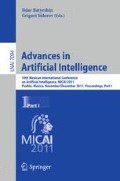Abstract
As computing becomes pervasive, there are increasing opportunities for building collaborative multiagent systems that make use of multiple sources of knowledge and functionality for validation and reliability improvement purposes. However, there is no established method to combine the agents’ contributions synergistically. Independence is usually assumed when integrating contributions from different sources. In this paper, we present a domain-independent model for representing dependences among agents. We discuss the influence that dependence-based confidence determination might have on the results provided by a group of collaborative agents. We show that it is theoretically possible to obtain higher accuracy than that obtained under the assumption of independence among the agents. We empirically evaluate the effectiveness of a collaborative multiagent system in the presence of dependences among the agents, and to analyze the effects of incorrect confidence integration assumptions.
Access this chapter
Tax calculation will be finalised at checkout
Purchases are for personal use only
Preview
Unable to display preview. Download preview PDF.
References
Becker, R., Corkill, D.: Determining confidence when integrating contributions from multiple agents. In: Proceedings of the Sixth International Joint Conference on Autonomous Agents and Multi-Agent Systems (AAMAS 2007), pp. 449–456. The International Foundation for Autonomous Agents and Multiagent Systems (IFAAMAS) (May 2007)
Conte, R., Castelfranchi, C.: Simulating multi-agent interdependencies. a two-way approach to the micro-macro link. In: Social Science Microsimulation [Dagstuhl Seminar, May 1995], pp. 394–415. Springer, London (1996), http://portal.acm.org/citation.cfm?id=647378.724484
Corkill, D.D.: Collaborating software: Blackboard and multi-agent systems & the future. In: Proceedings of the International Lisp Conference, New York (October 2003), http://mas.cs.umass.edu/paper/265
Dai, Y., Xie, M., Poh, K., Ng, S.: A model for correlated failures in n-version programming. IIE Transactions 36(12), 1183–1192 (2004)
Grosz, B.J.: Aaai-94 presidential address: Collaborative systems. AI Magazine 17(2), 67–85 (1996)
Guha, R., Kumar, R., Raghavan, P., Tomkins, A.: Propagation of trust and distrust. In: Proceedings of the 13th International Conference on World Wide Web, WWW 2004, pp. 403–412. ACM, New York (2004), http://doi.acm.org/10.1145/988672.988727
Huynh, T.D., Jennings, N.R., Shadbolt, N.R.: An integrated trust and reputation model for open multi-agent systems. Autonomous Agents and Multi-Agent Systems 13(2), 119–154 (2006)
Jøsang, A., Ismail, R., Boyd, C.: A survey of trust and reputation systems for online service provision. Decision Support Systems 43, 618–644 (2007), http://portal.acm.org/citation.cfm?id=1225318.1225716
Latif-Shabgahi, G., Bass, J.M., Bennett, S.: A taxonomy for software voting algorithms used in safety-critical systems. IEEE Transactions on Reliability 53(3), 319–328 (2004)
Littlewood, B., Miller, D.R.: A conceptual model of the effect of diverse methodologies on coincident failures in multi-version software. In: Fehlertolerierende Rechensysteme/Fault-Tolerant Computing Systems. Internationale GI/ITG/GMA-Fachtagung, vol. 3, pp. 263–272. Springer, London (1987)
Looker, N., Munro, M., Xu, J.: Increasing web service dependability through consensus voting. In: COMPSAC 2005: Proceedings of the 29th Annual International Computer Software and Applications Conference (COMPSAC 2005), vol. 2, pp. 66–69. IEEE Computer Society, Washington, DC, USA (2005)
Mitchell, H.: Multi-Sensor Data Fusion. Springer, Heidelberg (2007)
Parker, J.R.: Multiple sensors, voting methods, and target value analysis. In: Kadar, I. (ed.) Proc. SPIE, Signal Processing, Sensor Fusion, and Target Recognition VIII, Presented at the Society of Photo-Optical Instrumentation Engineers (SPIE) Conference, vol. 3720, pp. 330–335 (July 1999)
Parker, J.: Voting methods for multiple autonomous agents. In: Proceedings of the Third Australian and New Zealand Conference on Intelligent Information Systems, ANZIIS 1995, pp. 128–133. IEEE Computer Society, Perth (1995), citeseer.ist.psu.edu/339155.html
Sheth, A., Henson, C., Sahoo, S.S.: Semantic sensor web. IEEE Internet Computing 12(4), 78–83 (2008)
Sichman, J.S., Conte, R.: Multi-agent dependence by dependence graphs. In: Proceedings of the First International Joint Conference on Autonomous Agents and Multiagent Systems: Part 1, AAMAS 2002, pp. 483–490. ACM, New York (2002), http://doi.acm.org/10.1145/544741.544855
Sichman, J.S.: Depint: Dependence-based coalition formation in an open multi-agent scenario. J. Artificial Societies and Social Simulation 1(2) (1998)
Smiley, M.: Carry small, live large: Situational awareness. White paper, Intel Corporation: Intel Developer Forum (August 2008), http://electronics.wesrch.com/Paper/paper_details.php
Townend, P., Groth, P., Xu, J.: A provenance-aware weighted fault tolerance scheme for service-based applications. In: ISORC 2005: Proceedings of the Eighth IEEE International Symposium on Object-Oriented Real-Time Distributed Computing, pp. 258–266. IEEE Computer Society, Washington, DC, USA (2005)
Vouk, M., McAllister, D., Eckhardt, D., Kim, K.: An empirical evaluation of consensus voting and consensus recovery block reliability in the presence of failure correlation. Journal of Computer and Software Engineering 4, 367–388 (1993)
Zavala, L., Huhns, M.N.: Analysis of coincident failing ensembles in multi-version systems. In: Proceedings of the 19th IEEE International Symposium on Software Reliability Engineering: Dependable Software Engineering Workshop. IEEE Press, Los Alamitos (2008)
Zavala Gutierrez, R.L., Huhns, M.N.: On building robust web service-based applications. In: Cavedon, L., Maamar, Z., Martin, D., Benatallah, B. (eds.) Extending Web Services Technologies: The Use of Multi-Agent Approaches, ch. 14, pp. 293–310. Kluwer Academic Publishing, New York (2004)
Author information
Authors and Affiliations
Editor information
Editors and Affiliations
Rights and permissions
Copyright information
© 2011 Springer-Verlag Berlin Heidelberg
About this paper
Cite this paper
Zavala, L., Huhns, M., García-Vega, A. (2011). Collaborative Redundant Agents: Modeling the Dependences in the Diversity of the Agents’ Errors. In: Batyrshin, I., Sidorov, G. (eds) Advances in Artificial Intelligence. MICAI 2011. Lecture Notes in Computer Science(), vol 7094. Springer, Berlin, Heidelberg. https://doi.org/10.1007/978-3-642-25324-9_8
Download citation
DOI: https://doi.org/10.1007/978-3-642-25324-9_8
Publisher Name: Springer, Berlin, Heidelberg
Print ISBN: 978-3-642-25323-2
Online ISBN: 978-3-642-25324-9
eBook Packages: Computer ScienceComputer Science (R0)

